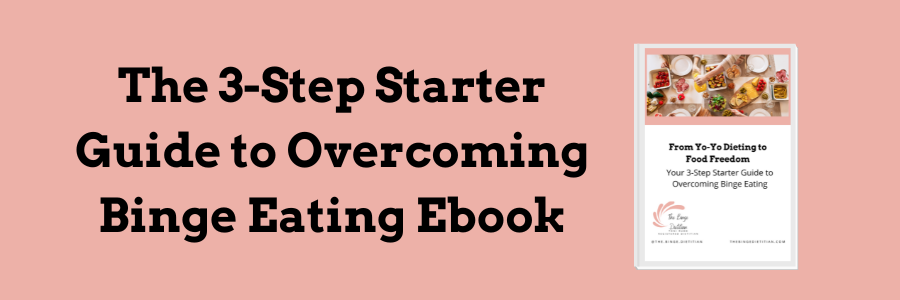FAD diet red flags in 2024
January often brings a wave of fad diets, promising quick fixes and transformation which will make you ‘healthier’ and most importantly, ‘happier’. For those caught in the cycle of binge eating, this time can be particularly challenging. Let's explore why steering clear of the January diet trap is crucial if you want to stop binge eating.
What is a fad diet?
A fad diet is an eating plan which often promises rapid weight loss, these diets focus on solely changing specific foods or eating patterns. They are seen as a “quick fix” and they tend to lack scientific backing. Dieting may inadvertently contribute to the cycle of yo-yo dieting, and binge eating behaviours, ultimately casting a shadow on mental and physical health.
Here are some red flags to spot a FAD diet:
🚩They promise rapid and unachievable weight loss.
🚩The overall goals are based solely on appearance rather than health and often they use ‘before and after photos’.
🚩They suggest replacing everyday foods with expensive alternatives.
🚩 It encourages restriction or severe limiting of a whole food group.
🚩 They recommend eating based on genetics or blood type.
🚩They try to sell you various products or supplements.
🚩 They hide behind the 'wellness' label but is really about strict food control.
🚩Recommend the same diet for everyone.
🚩Recommend ‘detoxing’ or ‘cleansing’.
The Impact of Fad Dieting
Short-Term Effects:
Quick, temporary changes in weight may occur due to water loss and restricted caloric intake. However, these changes are often unsustainable and can lead to frustration and disappointment as most dieters do not maintain weight loss over the long term (over 2 years) and often end up gaining more weight than was lost.
Dieting can impact individuals emotionally too. Short-term effects may include mood swings, irritability, preoccupation with food and heightened stress levels due to the restriction on food.
Long-Term Effects:
Dieting can have profound psychological and physical consequences. Individuals may develop an unhealthy relationship with food, leading to increased cravings and binge eating episodes. Physically, long-term dieting can slow down metabolism, negatively impact bone health, and compromise the immune system.
Read more about the long-term effects of dieting here.
What you lose from Dieting:
Time:
Constant focus on food and adherence to restrictive diets consume valuable time that could be spent on more fulfilling activities. The constant cycle of dieting, weight loss, and regain creates a perpetual loop, taking away precious moments from life.
Money:
Many diets come with financial costs, including the purchase of special foods, supplements, or meal plans. Additionally, pursuing quick fixes can be a costly investment in products that may not deliver sustainable results.
Health:
The potential negative health consequences of certain diets need careful consideration. Extreme diets lacking essential nutrients can lead to deficiencies, impacting overall health. Furthermore, the stress associated with restrictive eating patterns can have adverse effects on mental well-being.
What to do Instead:
If you’re someone who has a tendency to pick up fad diets and you know that dieting is not the sustainable solution you’ve been seeking, then it's time to explore alternatives that benefit your long-term mental and physical health.
For more information, read this blog post about the alternative approaches to dieting.
Quick fixes or FAD diets may promise immediate results, but the reality is that they often fall short of addressing the root causes behind issues like binge eating and an unhealthy relationship with food. Instead, consider a holistic approach that goes beyond superficial solutions. Sound good? Let’s chat.
My Mission: Embracing a balanced and sustainable approach
At The Binge Dietitian, my mission is simple yet powerful: to help yo-yo dieters free themselves from binge eating and find lasting peace with food.
I am passionate about guiding you towards a healthier relationship with both your body and the food you consume. Together, we will set sustainable and realistic goals that support your overall physical and mental health.
Learn more about my 1:1 consultations and how they can empower you to break free from dieting and binge eating. Click here to explore my support services
Don't let dieting and binge eating control your life any longer. Contact me here to find out how I can support you.


